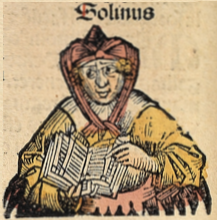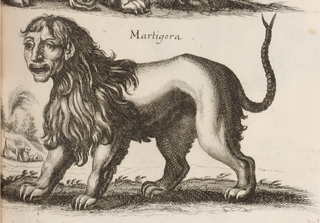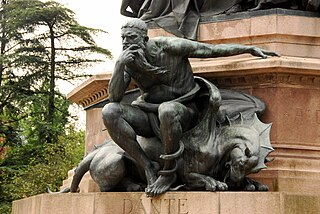English usually refers to:

Britomartis was a Greek goddess of mountains and hunting, who was primarily worshipped on the island of Crete. She was sometimes believed to be an oread, or a mountain nymph, but she was often conflated or syncretized with Artemis and Aphaea, the "invisible" patroness of Aegina. She is also known as Dictynna.
Category, plural categories, may refer to:

Gaius Julius Solinus was a Latin grammarian, geographer, and compiler who probably flourished in the early 3rd century AD. Historical scholar Theodor Mommsen dates him to the middle of the 3rd century.
Isthmian Games or Isthmia were one of the Panhellenic Games of Ancient Greece, and were named after the Isthmus of Corinth, where they were held. As with the Nemean Games, the Isthmian Games were held both the year before and the year after the Olympic Games, while the Pythian Games were held in the third year of the Olympiad cycle.

The manticore or mantichore is a Persian legendary creature similar to the Egyptian sphinx that proliferated in western European medieval art as well. It has the head of a human, the body of a lion and a tail of venomous spines similar to porcupine quills, while other depictions have it with the tail of a scorpion. There are some accounts that the spines can be shot like arrows, thus making the manticore a lethal predator.
Gaius, sometimes spelled Gajus, Kaius, Cajus, Caius, was a common Latin praenomen; see Gaius (praenomen).
Test(s), testing, or TEST may refer to:

Calpe, also Kalpas or Calpas, was a port city of ancient Bithynia in Asia Minor, on the shore of the Black Sea. It was located not far from the mouth of the river Calpas. It was mentioned in Xenophon's Anabasis. Xenophon, who passed through the place on his retreat with the Ten Thousand, describes it as about halfway between Byzantium and Heraclea Pontica on a promontory, part which projects into the sea is an abrupt precipice. The neck which connects the promontory with the mainland is only 400 feet (120 m) wide. The port is under the rock to the west, and has a beach; and close to the sea there is a source of fresh water. The place is minutely described by Xenophon. The place is mentioned also by Pliny the Elder, Solinus, Arrian, who places it 210 stadia from the mouth of the Psilis, and Stephanus of Byzantium.
The Islands of Diomedes were named after Diomedes, King of Argos. Diomedia (Διομήδεια), one of these islands, was according to the Greek myths where Diomedes was buried. The islands are associated with modern-day Palagruža archipelago.

In Greek mythology, the name Crete may refer to several figures, all of whom are associated with the homonymous island of Crete, and may have been considered its eponyms:
Solinus was a British-bred, Irish-trained Thoroughbred racehorse and sire. A specialist sprinter, he won eight races over five and six furlongs in a ten-race career which lasted from June 1977 until October 1978. Solinus was a long horse, bay coloured with white socks on his hind feet. As a two-year-old, he won three of his four races, including the Coventry Stakes in England and the Anglesey Stakes in Ireland. In the following year, he was the dominant sprinter in Britain and Ireland, winning the Ballyogan Stakes, King's Stand Stakes, July Cup and William Hill Sprint Championship. He was then retired to stud but died in 1979.
This page is based on this
Wikipedia article Text is available under the
CC BY-SA 4.0 license; additional terms may apply.
Images, videos and audio are available under their respective licenses.




